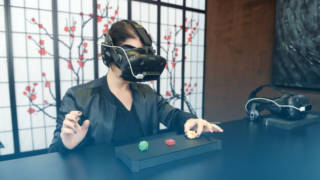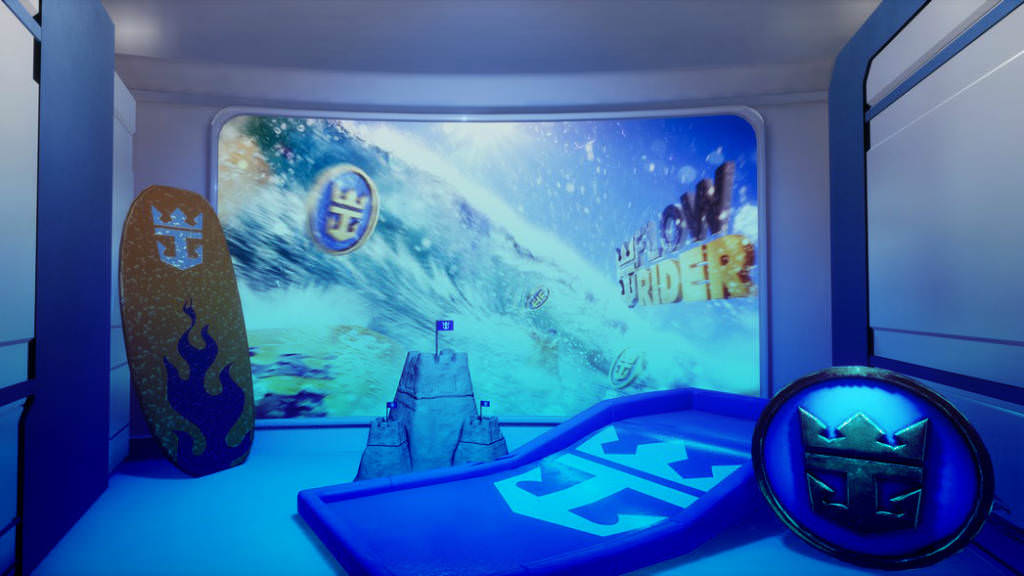
The Internet of Things is drastically changing all aspects of life, including vacationing. Major cruise brands such as Carnival Cruises, Princess Cruises and Royal Caribbean have been quick to evolve with the ever-changing technology landscape by introducing fast broadband across its ships, integrating video game technology to attract younger passengers and families and embracing virtual and augmented reality as marketing tools.
Royal Caribbean Cruises Ltd. (RCL) showcased a series of new technologies that will be rolled out across its Royal Caribbean International, Celebrity Cruises and Azamara Club Cruises brands this year. The company recreated the at-home, terminal and on-ship experiences at the massive Duggal Greenhouse at the Brooklyn Navy Yard to illustrate how new technology is changing the entire cruise experience.
Richard D. Fain, RCL’s chairman and CEO, told AListDaily that the Internet of Things has opened up new opportunities for the brand to connect with consumers and improve their vacation experience with the company’s 48-ship fleet.
“Everyone having a phone or some type of connected device today allows the cruise experience to become integrated into the Internet of Things,” Fain said. “Instead of wearing a device, you can just use your iPhone or Android device. People want their technology integrated, and the ubiquity of the smartphone allows us to have technology available to anyone at anytime so they can use it as they want.”
RCL has partnered with Jaunt VR to shoot a series of 360 videos that encapsulate some of the excursion experiences available at ports of call around the world. Three experiences were demonstrated at the event, but additional production is underway to add to that library.
Jay Schneider, senior vice president of digital at RCL, told AListDaily that VR headsets are now available at the excursions desks on ships for people to get previews of trips before purchasing them. They can also be downloaded at home for any headset and they’re playable on YouTube 360 for those without a device.
“There are a lot of first-time cruisers who don’t know what our excursions are about, so VR is a great way to give them a taste of what it’s like to be 500 feet above the ground with the wind at your face in a hot air balloon,” Schneider explained.
“VR didn’t even exist a couple years ago, and now it’s exploding,” Fain added. “We’re working hard to stay on the crest of that explosion. We’re even using VR to design new ships like the Celebrity Edge, which allowed our designers to see every aspect of the ship in 3D using CAVE technology.”
RCL also introduced a culinary VR experience at the event, which combined HTC Vive headsets with real food.
“The culinary VR experiment came from our belief that you can use technology to enhance the dining experience,” Schneider said. “We essentially hack your senses through this gorgeous VR world that matches the cuisine. The guest moves through the cuisine courses with immersive audio and video. We layered augmented reality to the experience, so guests can see their hands in the real world.”

Schneider said this concept is currently in its beta phase, but his goal is to pilot this on a ship at sea one day.
“We have great dining experiences at sea and we know our guests want different types of experiences,” Schneider said.
Augmented reality gaming will soon be added to RCL ships. The company featured a trio of “midway-style” games (a term that describes skill games found at the mid-points of boardwalks and ships) like Ring Toss Challenge, Plinko and a Duck, Duck Bear Shooting Gallery. What looks like a series of large, colorful posters on the wall come to life through smartphones for travelers to play. One of the games, Plinko, employs a Microsoft Kinect for hand-controls, while the other two games use smartphones for interaction with objects. The plan is for these types of free games to be added to the midway area of RCL ships over the coming year.
AR was also on display through X-Ray technology, which uses art located throughout the vessel as a way to look at the inner workings of the ship. Guests will be able to peer through walls using smartphones to see inside the kitchen or the engine room. Even the staterooms will one day incorporate AR, as one demo showed a ceiling turned that into a starry night sky while the floor became a waterway.
Schneider said the gamification of many aspects of the cruise experience has been helped by the ubiquity of gaming across all age groups, thanks in part to the rise of casual games on smartphones.
“Gaming is something a lot of guests like to do on board, and we have the fastest internet at sea,” Schneider said. “One of the things games do really well is connect people from all over the world. People want to stay connected, even when they’re on vacation. Games have amplified those connections. We’re recognizing that the consumer wants to always be connected anywhere they are on the ship.”
And gaming is just part of that connected experience. The Allure of the Sea ship allows passengers to connect to Spotify, for example, and social media has become a key element to the connected cruise experience.
“Everybody wants unique experiences today and they want to share their experiences across social media,” Fain said. “We added pervasive WiFi because people want to access information from outside of the ship, but many want to share their experiences on the cruise with friends. We see that as free advertising. It’s the best way for us to market our experience by having guests share their good times with all of their friends.”
This shift to embrace new technology, including the use of artificial intelligence in the form of a virtual concierge that appears on the Sea Beyond app, is a big push by RCL to market its cruise lines to millennial and younger audiences. It also allows the line to remain in the technology race with other companies like Carnival Corp. and Disney Cruise Line.
Fain said technology is expected by today’s passengers, and RCL’s research has found that Baby Boomers, Gen X, and millennial guests are all willing to pay more on experiences than material goods. The Internet of Things opens new experiences that RCL can use to market directly to these generations, while providing a platform for guests to further amplify their individual experiences with this technology across social media.

